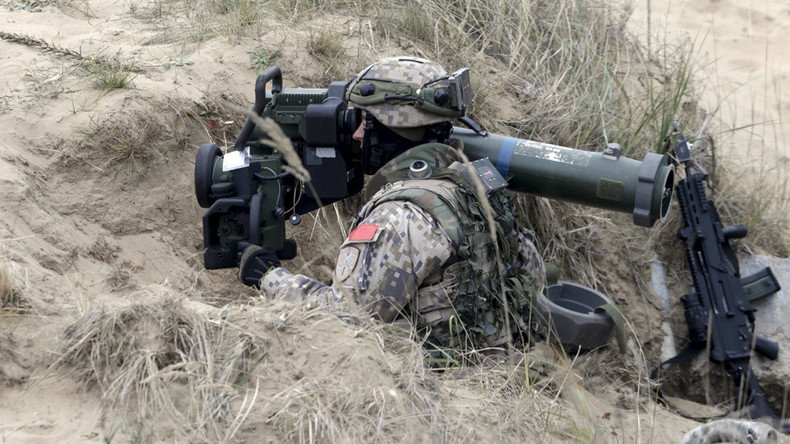NATO logic: Russia is a grave threat, but expansion ‘nothing to do’ with Moscow

The 28-member western military bloc has once again “categorically” denied that it poses any threat to Russia, arguing that its ongoing enlargement is “not directed against anyone”.
The comments are just the latest in the war of words between NATO and Russia, but it’s another example of how nonsensical the alliance’s conflicting talking points are.
"The NATO that emerged after the Soviet Union collapsed is basically a US-run intervention force" http://t.co/yGnscpv9lV#chomsky
— Danielle Ryan (@DanielleRyanJ) November 7, 2014Foresight from 1949
First, let’s backtrack for a moment. About three and a half months after NATO was established in 1949, then US Senator Robert A. Taft - the son of President William Howard Taft — made a speech in which he explained his reasoning for voting against the establishment of the alliance.
By arming nations against the Soviet Union, Taft said NATO would simply exist as an “offensive and defensive military alliance against Russia”. He added: “I believe our foreign policy should be aimed primarily at security and peace, and I believe such an alliance is more likely to produce war than peace.”
Taft even suggested that provoking the Russians in such a way could lead to the outbreak of a third World War, one which would have the potential to “destroy civilization on this earth”.
On this matter, Taft had something which is lacking in today’s Washington: the benefit of foresight. Without necessarily agreeing with all of it, he managed to put himself in Russia’s shoes and understood that it would be illogical to dismiss Moscow’s concerns out of hand. He worried that if Russia began to feel it had been “ringed” in by “so-called defensive arms” that this could lay the groundwork for war.
“Unfounded” criticism?
Fast forward sixty-six years to a world without the Soviet Union, but with a variety of other very real and pressing problems. Today, the heads of present-day NATO are adamant that while the Soviet Union may have been the reason for its initial existence, its military might is now directed against no one in particular. Any suggestion that NATO or its policies could be viewed as a threat are “unfounded” and no one need worry; this is a purely “defensive” alliance.
But here’s what doesn’t add up.
How seriously can we take the claim that NATO’s enlargement in Europe has had nothing to do with Russia, when for the last year various heads of state and high level officials within the EU and the US — including Barack Obama — have been citing Russia as one of the gravest threats to humanity? How can NATO cite Russia as a grave threat one minute, and then claim that its expansion has absolutely nothing to do with Russia the next?
Recall that Obama named Russia as one of the top security threats in 2015 — alongside ISIS and Ebola. US Secretary of Defense Ashton Carter has labelled Russia a “very, very significant threat” and a selection of other Pentagon generals have lined up to wax lyrical about the fact that Russia is not only a threat, but an “existential” one, at that. On the other side of the pond then, you had British foreign secretary Philip Hammond last year naming Russia potentially the “single greatest threat” to the UK’s security. In what universe Russia decides to attack Britain, it is hard to imagine, but trumpeting the ‘threat from Russia’ seemed to be all the rage last year.
Of course, when the Pentagon starts naming potential boogeymen, it can easily be chalked up to the usual ‘give us a bigger budget’ spiel — despite the fact that the Pentagon spends about 10 times more than Russia does on defense. If you’re running out of ideas, the specter of war with a menacing Russia bent on world domination is probably always a good way to stave off cuts. But when the president himself starts listing Russia as a threat on almost the same level as bloody and barbaric terror groups, that’s quite a pronouncement.
Oh no! Spending 10X more than Putin on military has left us vulnerable, better spend another trillion asap! http://t.co/E7NgXQPzln
— Mark Ames (@MarkAmesExiled) August 14, 2015It’s also why it makes little sense to believe NATO spokespeople when they are trotted out to let everyone know that expansion has absolutely nothing to do with Russia. By the same token, we should take it with a pinch of salt when Washington says anti-missile defense systems in Europe are also — of course — absolutely nothing to do with Russia.
Interestingly though, when the tables are turned and Vladimir Putin names the US and NATO as national security threats for the first time, this apparently is outrageous. It is “fundamentally wrong” for the Russians to view the US as a threat, Pentagon spokesman Captain Jeff Davis says. There is simply “no reason” to label the US a threat to Russia’s security. Man, that crazy Putin guy just does not know which way is up.
So let’s recap: Russia is a threat to the US, but the US is not a threat to Russia and it would be terribly silly to even suggest such a thing.
Improbability of war doesn’t negate the threat
While it remains extremely unlikely that we will see an all-out conflict between Russia and NATO — given that neither have any real interest in attacking each other — NATO expansion still presents a genuine problem for Russia. After all, the world can take unpredictable turns. Ensuring Russia’s lasting security and stability is the foremost priority of any Russian president.
This is an analogy that’s been made a million times, but really, just imagine for a moment how the US would react if a Russian-led military alliance had marched up to its borders in Canada or Mexico, or both. Would any number of assurances from Moscow that it was ‘no threat’ to the US fly in Washington? Of course not.
Think of it this way: NATO blows a gasket when Russia flies its military aircraft over the Baltic Sea near its own borders. It’s “provocative” when Russia stages military exercises on its own territory, and imaginary Russian submarines have more than once caused all-out panic.
To really familiarize yourself with the illogic that permeates the White House and Pentagon thinking on the NATO/Russia question, consider that former US Secretary of Defense Chuck Hagel actually complained that Russia was “on NATO’s doorstep” and appeared to be utterly baffled as to how it got there. When questioned by AP reporter Matt Lee about the strange comment, then Pentagon press secretary John Kirby didn’t have much to say, because he “barely got a history degree”.
But this brings us to a wider, less amusing point. Washington’s attitude towards Russia since 1991 and the fall of the USSR has been that of a victor; we won, you lost and now you are no longer entitled to have your interests taken into account. Russia, in the eyes of those in the White House, is simply not allowed to conduct a foreign policy. Any attempt by Moscow to assert itself at any time, for any reason, is simply “aggression” and Putin an unruly “antagonist” — because, simply put, any effort to alter the current unipolar order will be met with huge resistance.
It's not always up to just one party to decide whether it's a threat. If Russia feels NATO is a threat, what then? https://t.co/iACGxcBTYx
— Alexander Frost (@AlexB_Frost) January 5, 2016The real problem with the NATO spokesperson’s comments this week is not so much that anyone is accusing it of getting ready to launch a sneak attack on Russia — it’s that it’s not always up to one party to decide what is or isn’t a threat. NATO may indeed believe Russia should not regard it as a threat, but if Russia feels that it is or that it could foreseeably be, then that must be taken into account.
Here’s an idea for 2016: With a refugee crisis that sees no end in sight and the continuing threat of terror blow-back in European cities combining to shake the entire foundation of the EU project, NATO states would be better off spending far less time thinking about Russia and a little bit more time thinking about themselves — because the sad irony is, NATO may now be as much a threat to itself as it is to anyone else.
The statements, views and opinions expressed in this column are solely those of the author and do not necessarily represent those of RT.













